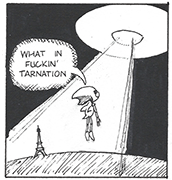|
Soonmot posted:If nothing else, I hope this strike forces a release of viewership numbers. I hate how streaming and other online platforms obscure or straight up hide their actual user metrics. Or just publish outright bullshit numbers and the press runs with them because  Then again, all ratings going back to the actual Nielsen boxes were just bullshit extrapolation as well.
|
|
|
|

|
| # ? May 24, 2024 03:07 |
|
If the contract forces them to release real numbers, they gotta' release real numbers. So, yeah. I hope that happens. This "nothing has ever made any money ever and we just make movies out of looooooove" bullshit was counteracted by people taking points on the gross instead of the net, but when you don't know what the viewership numbers even are, you have zero leverage, so it would behoove the guilds to demand this poo poo. loving Star Wars still hasn't turned a profit on paper.
|
|
|
|
"We have no way to measure success but also Squid Game is our most successful, most watched show of all time and we know that because"
|
|
|
|
That brings up a good question: how do you judge viewership for a streaming series? Minutes watched? Minutes watched per episode? Say what you will about Nielsen ratings, at least everyone agrees what it measures.
|
|
|
|
Edward Mass posted:That brings up a good question: how do you judge viewership for a streaming series? Minutes watched? Minutes watched per episode? Say what you will about Nielsen ratings, at least everyone agrees what it measures. They have better data than studios have literally ever had ever. This isn't a small sampling of people filling out notebooks of what they watched, representing thousands and thousands of people where ad rates (and thus, revenue) are only measured four times per year on sweeps weeks. It's actual, real data that represents exactly what people who pay for your service are paying for.
|
|
|
nine-gear crow posted:Or just publish outright bullshit numbers and the press runs with them because Though wouldn’t that then put them in “actual felony fraud” territory? At least under the assumption that they’d be knowingly bullshitting investors.
|
|
|
|
|
Regalingualius posted:Though wouldn’t that then put them in “actual felony fraud” territory? At least under the assumption that they’d be knowingly bullshitting investors. All the more reason to dig their heels on hiding viewership data. Getting the books forced open might lead to billion dollar lawsuits
|
|
|
|
Which is precisely why the unions should be forcing them to do it. This opportunity won't come up again for at least a decade, most likely. It's time to fight for actual systemic change now that you've got the executives looking like douchebags to their real customers: investors.
|
|
|
|
i refuse to believe they don't know what's popular. most of the viewers for those services use some kind of app — on a phone, tv, tablet, computer, it doesn't matter. they track the absolute gently caress out of you, collecting minutes used, what you tapped on, how long you looked at a certain page, how often you log in, your browsing history, search history, poo poo like that. they know who watches what and for how long. there is no way they're collecting that information and not doing anything with it
|
|
|
|
Yeah their data must be insane. They know where people give up on shows, when they rewind scenes, when they rewatch episodes. I’d love to see some visualization of it all, it has to be fascinating. E- hey whoops there’s more posts since this one, my bad LividLiquid posted:The Youtube model. Raw number of views, time watched, and viewer retention across episodes and seasons.
|
|
|
|
I do think it's true that it's harder with streaming to figure out "why are we making money". With broadcast TV, it's simple: eyeballs sell ads, so the viewer-to-revenue relationship is very direct. With streaming, it's a lot more muddled! I think the studios are right that there's no obvious rule that's fair. The streamers do have great data, and I think they probably have figured out something like "the things that keep people subscribed aren't the same as the things that get most eyeballs". Maybe people subscribe to Netflix because there's one original series every three months that they're really into. In the months that new stuff doesn't drop, people might throw on an episode of whatever evergreen sitcom Netflix currently has the rights to, The Office or Friends or Seinfeld, but *that's not why they subscribe to Netflix*. But you don't have real hard objective measures to show that, just statistical modeling where you might have made 300 different choices that get you different results, so you can't even give an objective breakdown of "here are the reasons we got this user's $10 this month". The stats modeling is really good, it just also can't be objective. So you're got a situation where, idk, maybe 1% of the money you're coming into revenues is due to The Office, but 15% of your streaming time is The Office. If you're paying out a per-eyeball-minute royalty structure, that means you're overindexing on "bland safe stuff that goes on in the background", and underpaying "the people who make the series that keep people subscribed to Netflix". That feels unfair? But, also, that's probably the only real objective way that you can do this at all, so "a per-eyeball residual structure doesn't adequately reflect our value proposition to our users" is just an excuse to say "hey let's not pay".
|
|
|
|
Beeftweeter posted:i refuse to believe they don't know what's popular. most of the viewers for those services use some kind of app — on a phone, tv, tablet, computer, it doesn't matter. they track the absolute gently caress out of you, collecting minutes used, what you tapped on, how long you looked at a certain page, how often you log in, your browsing history, search history, poo poo like that. they know who watches what and for how long. there is no way they're collecting that information and not doing anything with it There's a Marketingspeak term they use, it's called Demand, and it's some insane algorithm-derived metric that a lot of television and streaming companies use judge how people "feel" about certain shows they are making and airing without being able to assign any real hard numbers or data to it and they use the excuse that it's a proprietary black box system to not bother to explain it to anyone outside of their boardrooms. The term came up when Star Trek: Picard was on the air about how it "viewer Demand for the show was up by 200%" and people were saying "Yeah, that doesn't mean it's doubled its viewers, that just means that people are posting about it on Twitter and Facebook twice as much." So I watched a video by a company that specializes in tracking Demand and, well https://www.youtube.com/watch?v=Y4X-FHTGTiU I nearly loving threw up watching it, it was that much of Inside Baseball Hollywood studiobrain bullshit.
|
|
|
|
Pinterest Mom posted:I do think it's true that it's harder with streaming to figure out "why are we making money". With broadcast TV, it's simple: eyeballs sell ads, so the viewer-to-revenue relationship is very direct. With streaming, it's a lot more muddled! I think the studios are right that there's no obvious rule that's fair. These special cases have always existed in some form. Successful shows would be used to anchor a nightly block of comedies or dramas. Plenty of shows found an audience due to following a ratings juggernaut for a season or two. Premium cable channels would have a hit show (like The Sopranos or Game of Thrones or Homeland) that drove signups for those cable packages, while their other content just padded the offering the bit. The baseline residual system never accounted for that, and I don’t think it necessarily needs to, because ideally some transparency wrt viewership will help those special cases renegotiate more favorable contracts. Baronash fucked around with this message at 06:09 on Jul 17, 2023 |
|
|
|
I really hope these strikes kill streaming once and for all.
|
|
|
|
edit: i was out of it when I made this post and it made no sense
Crusader fucked around with this message at 11:31 on Jul 17, 2023 |
|
|
|
this strike also happens just as netflix and hbo are starting to serve ads. they need to offer advertisers some viewership data to negotiate cpm and fixed ad placements, so hopefully the unions can access that eventually
|
|
|
|
Snowy posted:Yeah their data must be insane. They know where people give up on shows, when they rewind scenes, when they rewatch episodes. I’d love to see some visualization of it all, it has to be fascinating. Hell, a lot of the streaming sites even know when you don't have their stream focused, like when you're in another window or doing things on another monitor. Netflix used to temporarily lower their bitrate if their stream wasn't in focus over a longer period.
|
|
|
|
Donnerberg posted:Hell, a lot of the streaming sites even know when you don't have their stream focused, like when you're in another window or doing things on another monitor. Netflix used to temporarily lower their bitrate if their stream wasn't in focus over a longer period. the thing i'm more worried about is how netflix and others will come up with loopholes for future discussions of residuals and kpi's by saying "well aaactually, the viewer only watched 80% of the episode (by skipping the intro theme and end credits), sooo" when it comes to contractual obligations we've seen companies like facebook overcounting views, and i'm sure we might see the opposite weaponization of kpi misinfo
|
|
|
|
Tree Reformat posted:I really hope these strikes kill streaming once and for all. Who do you imagine would be leading the charge to kill streaming: The companies and studios that own these streaming services and make money from them, or the actors and writers who create films/tv shows as a profession?
|
|
|
|
https://twitter.com/DiscussingFilm/status/1680943763382849536?t=pUf9Avjh6yeodNSv32MLIA&s=19 I'm enjoying how Discussing Film is wording their shutdown tweets
|
|
|
|
Baronash posted:Who do you imagine would be leading the charge to kill streaming: The companies and studios that own these streaming services and make money from them, or the actors and writers who create films/tv shows as a profession? If streaming is a bad deal for the people who create the shows (it is), then the only sustainable path is killing streaming as financially viable and morally acceptable.
|
|
|
|
I dunno, how about trying to make it a fair deal before throwing the baby out with the bathwater?
|
|
|
|
I wonder if the best outcome here is basically the YouTube model. The rightsholder of a show splits ad revenue and subscription revenue with the streaming service in some predetermined ratio. The more eyeballs the show gets, the more money everyone makes. The rightsholder makes its own show-specific deals, including on merchandising, product placement and residuals. Rightsholders can choose between a multitude of streaming services, competing on revenue split, product features, content policy and target audience. They can obviously also choose to release films in theaters before bringing them to a streaming service. Instead we currently have this mishmash of licensing deals and a glut of streaming services that apparently no one is happy with anyway.
|
|
|
|
Tree Reformat posted:If streaming is a bad deal for the people who create the shows (it is), then the only sustainable path is killing streaming as financially viable and morally acceptable. https://twitter.com/pajiba/status/1681019957432418304?s=20 quote:"Either the studios owe untold millions to their talents and paying it out will decimate their stock prices, or they owe so little because there really is no money in streaming and the bubble of their entire 21st century business model will burst in spectacular fashion." I think we're about to find out which.
|
|
|
|
Tree Reformat posted:If streaming is a bad deal for the people who create the shows (it is), then the only sustainable path is killing streaming as financially viable and morally acceptable. I mean to me that just says that the way studios transitioned to streaming was messed up, not that it was going to be inherently bad for writers/actors/etc. And this isn't entirely new. When television first became viable and broadcast networks realized how big it was gonna be, they basically forced everyone who was working on radio comedies and dramas and such to either switch to TV or not have a job anymore. This wasn't something the talent wanted, the actors liked doing radio and many writers worked better in that medium than TV (Arch Oboler was the big example, Lights Out! was huge but he couldn't transition and instead moved to directing low-budget films.) The way the studios moved to streaming- leading to the gutting of TV as we knew it and the virtual death of physical media- was very hastily thought out and they were able to get away with a lot, like keeping the numbers mostly internal so you don't even know how bad you're getting screwed on residuals. There was the 2007 WGA strike but they didn't have as much support as now and they had to cede a lot of ground, and that's the last bite at the apple anyone really got until now.
|
|
|
|
Tree Reformat posted:If streaming is a bad deal for the people who create the shows (it is), then the only sustainable path is killing streaming as financially viable and morally acceptable. I'm quite fond of being able to watch a television program at a time that's different from when it airs.
|
|
|
|
The inevitable outcome here is that there will be far less shows in production, and the industry will need to shrink. And that sucks for everyone, particularly those below the line. But basically, yeah, it happened because everyone saw Netflix making huge amounts of money and saying to themselves "Well hey, we could do that!" Then loving around only to find out that there's just not enough demand there, so who do you screw over? Your customers and your employees, of course!
|
|
|
|
Vegetable posted:I wonder if the best outcome here is basically the YouTube model. The rightsholder of a show splits ad revenue and subscription revenue with the streaming service in some predetermined ratio. The more eyeballs the show gets, the more money everyone makes. Thing is, the studio is the rightsholder 99% of the time because they're where the money comes from. It's all work for hire for the talent; writers and directors and actors don't own the shows they work on. And okay, yeah, movies and TV shows are expensive, your average director or screenwriter doesn't have that kinda cash, they kinda do need outside investors and those investors do have some legal right to try and make their investment back. And the other problem is that more views for a show don't necessarily mean more subscription revenue, and so subscription-only services (i.e. ones without ads) can't just look at how many views something gets, but have to work out whether that translates to more people subscribing. This is why you see a lot of shows being pulled not to be written off and buried forever, but moved to FAST (free ad-supported television) services like Tubi or Freevee. There you DO get money directly in proportion to how many people are watching. But, well, how are you gonna keep them down on the farm after they've seen Paris? Audiences are used to being able to pay a fee every month or so to be able to watch whatever, without it being interrupted by commercials. We're not going to be as enthusiastic about streaming if everything gets interrupted every 10 minutes.
|
|
|
|
It's really weird that the term "FAST" caught on as if it's a new concept.
|
|
|
|
|
Edward Mass posted:I dunno, how about trying to make it a fair deal before throwing the baby out with the bathwater? That would require seeing actors as people instead of props or flesh lights and what executive wants that?
|
|
|
|
First, this is an awesome thread! I've learned so much from y'all. I find it morbidly amusing that we've traveled the globe to end up right back where we started. Its clear that subscription ad-free content doesn't work long term. The Pajiba article is bang on. I think we'll get used to have commercials again relatively quickly, once most of the industry shifts back to it. The user experience for nearly every platform and service has gotten appreciably worse in the past five years and there's no solution to it. poo poo sucks. The other ticking time bomb is that most people under age 30 don't watch TV much at all. Networks will continue trudging out NCIS and Chicago Fire/Med/Food Cart Vendor shows for every last dollar. Streamers (grouped very loosely here) can cobble together Gen Z, milennial, and boomer to build... some sort of audience. But beyond that, it gets bleak.
|
|
|
|
Narcissus1916 posted:First, this is an awesome thread! I've learned so much from y'all. I think it works for more niche stuff. Like, the Criterion Channel is probably in a good spot, they have a relatively small catalog of well-presented classic films and supplementary material and they curate the poo poo out of it- every month stuff rotates in and out, and they tell you what's leaving at the end of the month and that can be an incentive to catch it before it leaves. (It's honestly how I make my decisions about what to watch there.) Shudder's likely doing okay, they do horror movies and like a few other things but mostly horror. You go there when you wanna see a scary movie because they've got a good selection of 'em. What happened was twofold- every major studio wanted their own service (even if due to vagaries of corporate structure they still have to license stuff from themselves and they don't keep everything exclusive), AND they wanted a whole bunch of originals because Netflix started the ball rolling there. And also Apple wanted in because why the gently caress not. I think everyone observing realized the bubble could not sustain itself but nobody was gonna back down.
|
|
|
|
Pinterest Mom posted:I'm quite fond of being able to watch a television program at a time that's different from when it airs. Honestly, I was pretty happy with stuff like Comcast On Demand. Usually newest episodes were up within a couple of days and Funimation had it's own channel and showed a bunch of anime that wasn't on regular tv. That rocked. Nichael posted:It's really weird that the term "FAST" caught on as if it's a new concept.
|
|
|
|
It looks like at least Max and Prime Video are offering shows to other services. Take it to its logical conclusion, and it seems likely that they will end up on the Criterion Channel model, where nothing is truly exclusive and things cycle in and out based on licensing agreements. They’ve maybe realized that consumers don’t truly want a bottomless pool of content and that 99% of shows never gets watched. Consumers want some curation, even if it is as rudimentary as “Leaving this service soon — watch it now or never!” To be sure there will probably always be some initial exclusivity — Max is where you see the latest GoT shows first. And that’ll be why networks still want to make originals. But they won’t want to hold on to content in perpetuity. This perhaps will be how subscriptions become financially viable.
|
|
|
|
Happy Landfill posted:
My hunch is the former for some of the big shows and the latter for the average streaming show
|
|
|
|
Happy Landfill posted:Honestly, I was pretty happy with stuff like Comcast On Demand. Usually newest episodes were up within a couple of days and Funimation had it's own channel and showed a bunch of anime that wasn't on regular tv. That rocked. I laugh whenever I see shows that were advertised as SUPER EXCLUSIVE YOU'LL ONLY SEE THIS ON STREAMING turn up a year later on cable, it's how I saw the first two seasons of Harley Quinn. I don't think On Demand will ever reach the heights it used to be. Too consumer friendly when you can charge extra on streaming. E: lol holy poo poo that Blockbuster-Enron partnership InsensitiveSeaBass fucked around with this message at 23:36 on Jul 17, 2023 |
|
|
|
I think they also got bit by the fact that vertical integration actually has drawbacks when the marketplace is saturated. You need to pay for the infrastructure and, in this case, for the content, rather than just licencing out your stuff for an easy payday (albeit maybe a smaller one than you'd like). Like, the market probably CAN sustain a couple of players in the general entertainment streaming market, but not the 7-10 players that are trying to play in that space, and no-one wants to be the first to back down because what if the other guys blink first and you get to be Connor MacLeod, winning The Prize at the end when There Is Only One.
|
|
|
|
Absolute loving ghouls https://twitter.com/ChrisStephensMD/status/1681005154609545216?s=20
|
|
|
|
High Warlord Zog posted:My hunch is the former for some of the big shows and the latter for the average streaming show I think the core thing here is that everyone played follow-the-leader in chasing Netflix in the content-spending arms race, but when you spend $20 million an episode on House of the Dragon or $15 million an episode of The Mandalorian, you aren't going to generate nearly enough revenue from new subscriptions to offset those expenses.
|
|
|
|

|
| # ? May 24, 2024 03:07 |
|
Happy Landfill posted:I feel like, best case scenario, is that we're all going to just go back to cable. I think that basically what everyone other than the audience (the creatives, savvier execs, advertisers) really want in the end. That model sucks for us, but the industry really liked how consistent and predictable it was. Really, this whole Streaming Wars is really about finding out who the next effective cable conglomerate will be, then it'll be back to business as usual.
|
|
|































